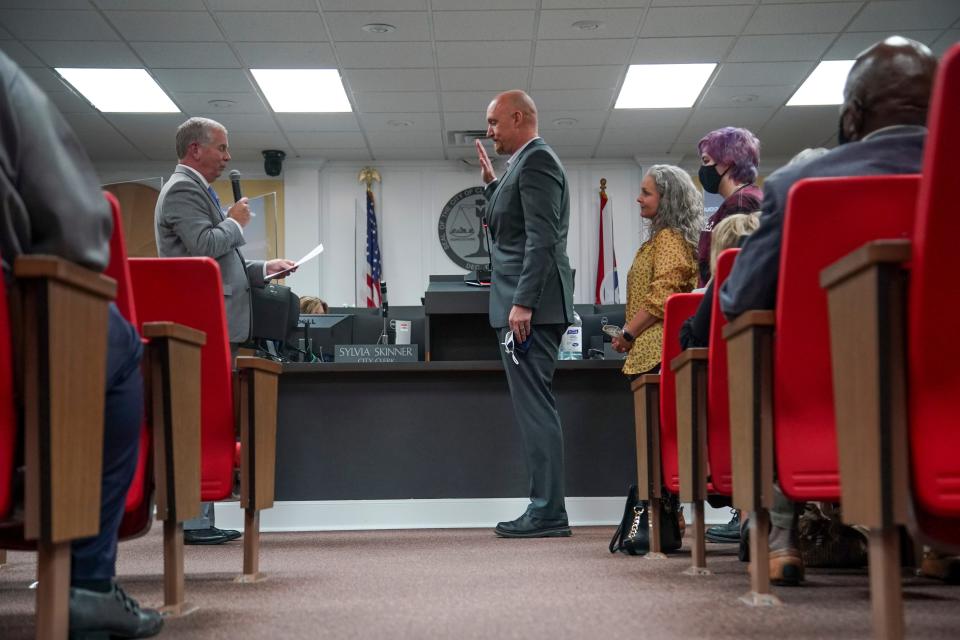Tennessee's fifth-largest city wants out of state's Sunshine Law
In Tennessee's fifth-largest city, some elected officials want permission to meet and discuss public business in secret.
The Clarksville City Council voted on Sept. 7 to seek legislative approval from the state to be exempt from the state's open meetings laws, also known as the “Sunshine Laws,” which bar elected government bodies like councils from meeting behind closed doors to discuss the public's business.
The motion passed with an 8-4 vote and little discussion from council members.
“I’d like to ask the state legislature to allow local governments to fall under the same Sunshine Laws and rules that they follow,” said Council member Wallace Redd, who pushed to include the item in the city's upcoming legislative agenda. “They make the laws—we should have the same thing.”
Sunshine Laws require all communications, meetings, decisions and conversations that discuss business to be open to the public and receive proper public notice prior to the event.
Council member Karen Reynolds voiced her support for the push, calling the transparency laws “stifling.”
“I appreciate this amendment,” she said. “I think that the Sunshine Law, as written, stifles communication and collaboration.”
Under Tennessee law, "All meetings of any governing body are declared to be public meetings open to the public at all times, except as provided by the Constitution of Tennessee."
Further, the law defines a governing body as "members of any public body which consists of two (2) or more members, with the authority to make decisions for or recommendations to a public body on policy or administration."
The law does have a provision that a "chance meeting" of two of more members of a public body isn't considered an open meeting — provided that it isn't used to "decide or deliberate public business in circumvention of the spirit or requirements" of the Sunshine Law.
Members of Tennessee state legislature do not fall under the same Open Meetings Law as local governing bodies such as city councils or county commissions. The legislature has faced its own criticism over issues related to transparency.
The Court of Appeals in Mayhew v. Wilder determined in 2001 the Open Meetings Act does not apply to the General Assembly because the legislature’s origin cannot be traced back to legislative action, but is rather “a creature of the Constitution.”
All legislative floor sessions and committee hearings are open to the public. But groups of lawmakers regularly meet privately and the Republican and Democratic caucuses in the Tennessee General Assembly over the years have been inconsistent in allowing the public to attend.
Meanwhile, the House in the past has come under criticism for holding what are dubbed "pre-meetings," where lawmakers gather outside of typical hearing rooms — and with little public notice — to meet with lobbyists and other stakeholders to go over legislation. Facing mounting criticism, the House has stopped the practice.
When council member Brian Zacharias asked Redd why he was not asking the state to follow rules similar to local bodies, Redd countered that he did not care which rules they decided to adopt — only that it should be the same for the state and local bodies.

“They are imposing rules on us that they don’t have, so we should be allowed to have the same rules that they have,” he said.
The council's vote will not have any immediate impact. As a part of the city’s legislative package, it was merely added to the list of issues that the city will lobby the legislature on when lawmakers return in January. But the vote and the comments provide a rare public light into how some elected officials view the law requiring them to conduct the public's business openly.
Ken Paulson, director of the Free Speech Center at Middle Tennessee State University, said the move was counter to the fundamentals of democracy.
“From the very birth of this country, the first generations of Americans recognize that it was important to keep an eye on people in power,” he said. “Over time, local and state governments have recognized an affirmative duty to be as transparent as possible — and that is certainly consistent with the core principles this nation was founded upon.
“The truth is: democracy isn't always convenient. But most local legislator, legislators and council people understand that showing the public how they conduct themselves and how they spend tax-payers money is for the public good.”
Paulson said he had never heard of another city trying to exempt itself from state transparency laws.
“I've never heard of this kind of request to be exempt,” he said. “If somehow this were actually to pass for the Clarksville City Council, wait for the following legislative session where every municipality in the state will ask for exemption from their least favorite state regulations.”
The USA Today Network - Tennessee's coverage of First Amendment issues is funded through a collaboration between the Freedom Forum and Journalism Funding Partners.
Have a story to tell? Reach Angele Latham by email at alatham@gannett.com, by phone at 931-623-9485, or follow her on Twitter at @angele_latham
This article originally appeared on Nashville Tennessean: Clarksville City Council asks to be exempt from transparency law

